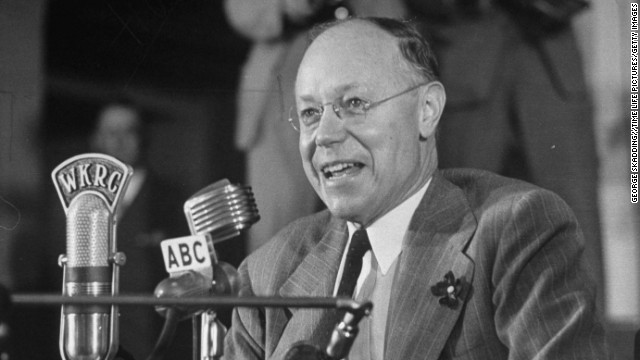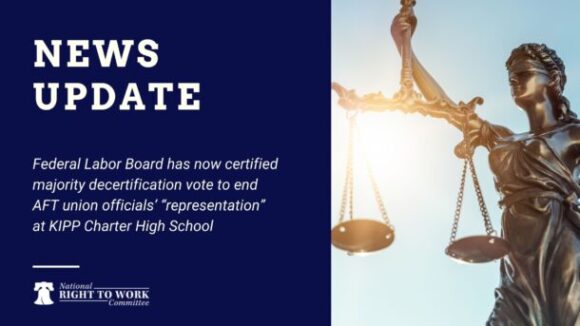Will Team Biden Weaponize Workers’ Pensions?
Big Labor abuse of worker pension and benefit funds as a means of advancing union bosses’ self-aggrandizing policy objectives is a familiar phenomenon.

Just since the beginning of 2012, four states — Indiana, Michigan, Wisconsin and West Virginia — have adopted Right to Work laws protecting employees from termination for refusal to join or pay dues or fees to an unwanted labor union. Consequently, a majority of the 50 states now prohibit forced financial support for a union as a condition of employment.
Moreover, several more states — including Montana, Colorado, New Mexico, Missouri, Kentucky, Pennsylvania, and New Hampshire — are now poised to poised to adopt Right to Work laws over the course of the next several years.
It’s not surprising, then, that Big Labor thinks it needs a “Hail Mary” play to retain its compulsory-unionism privileges. And top union bosses have apparently selected Harvard law professor Ben Sachs to be their quarterback.
In two pending federal lawsuits, one before Senior Judge Edward Lodge of the U.S. District Court for the District of Idaho, and the other before Judge J.P. Stadtmueller of the U.S. District Court for the Eastern District of Wisconsin, Sachs, long a “go-to” lawyer for union officials, is pushing for an extraordinary reinterpretation of the Fifth Amendment’s Takings Clause that would prohibit all federal and state Right to Work legislation. (See the link below for more information about the Idaho case.)
Sachs and the rest of his legal team insist that, in workplaces where Big Labor is empowered by law to represent all front-line workers, including union members and nonmembers alike, throughout all negotiations with the employer on matters concerning pay, benefits, and other terms of employment, union officials have a constitutional right to seize so-called “agency” fees from nonmembers on pain of termination if they refuse.
As the office of Idaho Attorney General Lawrence Wasden has explained in a brief to Judge Lodge, the Gem State’s Right to Work law and other such laws cannot possibly constitute in themselves or facilitate a “Taking” from the plaintiffs, the bosses of Pasco, Wash.-based Local 370 of the International Union of Operating Engineers. The fact is, under Idaho law, they and other union bosses are absolutely free to “persuade nonmembers to make voluntary payments either directly or through the payroll deduction provision in the collective bargaining agreement by convincing them of the services’ value.”
In an amicus brief furnished to Judge Lodge late last week, attorneys for the National Right to Work Legal Defense Foundation and Idaho attorney David Leroy reinforced Wasden’s case by pointing out that, if Sachs and his cohorts were correct, “the most appropriate remedy” for the federal courts to take would be to “strike down” Section 9(a) of the National Labor Relations Act (NLRA), which “authorizes [so-called] exclusive representation . . . . Only by striking down exclusive representation would unions be relieved of the alleged ‘burden’ of representing all employees in a unit, thus ending the taking of which Local 370 complains.”
Moreover, if union bosses really did have a “constitutional right” to exact forced fees from nonmembers and federal courts did not hold government-authorized “exclusive” representation (that is, monopoly bargaining) to be unconstitutional, then multiple provisions of the NLRA as amended by the 1947 Labor Management Relations Act (commonly referred to as Taft-Hartley), “perhaps the entire NLRA, would be unconstitutional, not just state Right to Work laws such as Idaho’s.”
The fact is, even in states without Right to Work protections, the amended NLRA provides for an array of circumstances under which union bosses may lawfully be denied the privilege of seizing money from union nonmembers as a condition of employment. Here we will focus on just one cited in the joint Leroy-Right to Work Foundation brief: “[U]ntil an employer agrees to a forced dues clause with a union, it is illegal under NLRA Sections 7, 8(a)(3) and 8(b)(2) to require employees to financially support a union”:
NLRA Section 7 provides employees the right to “refrain” from “assist[ing]” a union “except to the extent [emphasis added] that such right may be affected by an agreement requiring membership in a labor organization as a condition of employment as authorized in [Section 8(a)(3)]. . . . Section 8(a)(3) makes it unlawful for an employer to discriminate “in regard to hire or tenure of employment or any term or condition of employment to encourage or discourage membership in any labor organization,” except as provided for in a contractual forced dues clause. . . . And Section 8(b)(2) makes it unlawful for a union to cause an employer to violate Section 8(a)(3)’s prohibition.
If Sachs and his cohorts really believed their own far-fetched “Takings” argument, their litigation would be targeting wide swaths not just of the NLRA, but also of other federal labor laws such as the Civil Service Reform Act of 1978 (CSRA) and the Postal Reorganization Act (PRA) of 1970.
The mere fact that Sachs and company are singling out Taft-Hartley Section 14(b) for destruction despite the fact that their “Takings” contentions, such as they are, are just as applicable to other provisions in the amended NLRA as well as provisions in the CSRA, PRA, etc., shows that encouraging judicial activism on union bosses’ behalf is their real agenda.

Big Labor abuse of worker pension and benefit funds as a means of advancing union bosses’ self-aggrandizing policy objectives is a familiar phenomenon.

What impact does handing a union monopoly power to deal with your employer on matters concerning your pay, benefits, and work rules have on your pay?

Federal Labor Board has now certified majority decertification vote to end AFT union officials’ “representation” at KIPP Charter High School